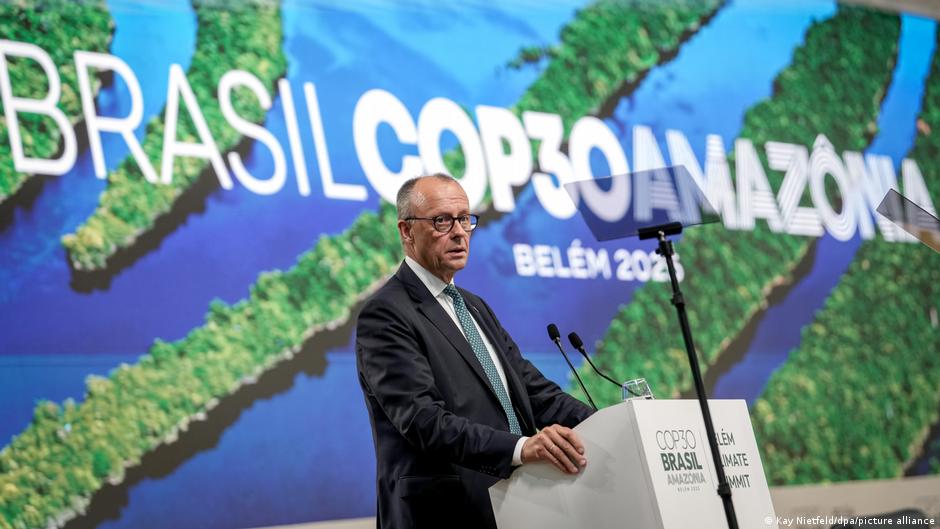During his brief visit to the UN COP30 summit in Brazil last week, German Chancellor Friedrich Merz was keen to show himself serious about climate protection.
“We are at a crossroads,” Merz told world leaders in the Amazon city of Belém, stressing that all countries must act now on climate change in the interest of their security and long-term prosperity.
But since his election in May, Merz has not taken on the role of a climate leader – and his trip to Brazil didn’t change that.
Focus on economic development at home
Economic growth is a top priority for Germany’s coalition government led by the conservative Christian Democratic Union/Christian Social Union (CDU/CSU) and the center-left Social Democrats (SPD).
By focusing on industry, infrastructure, digitalization and reducing bureaucracy, critics have accused the coalition of putting stability at stake.
In Belém, CDU leader Merz said Germany was focusing on innovation and technology to curb climate change, neglecting to mention that the technology to significantly reduce emissions – namely renewable energy – has long been available.
Merz remains committed to German and European climate targets, but these are not enough to limit global warming to 1.5 degrees Celsius (2.7 degrees Fahrenheit), which scientists say is vital to prevent the worst effects of climate change. The temperature limits were set in the Paris Agreement adopted a decade ago.
German climate reputation at risk
Countries like Germany, whose high standards of living today are based on early fossil fuel-led development and industrialization, see a greater responsibility to act on climate change. Since CO2 has been present in the atmosphere for centuries, past emissions continue to warm the planet.
Despite being a relatively small emitter compared to the US or China, the country is now in the top 10 carbon polluters. And critics say Merz’s downplaying of Germany’s role and responsibility in fighting global warming jeopardizes the image it has acquired as a climate leader.
Addressing the Bundestag in the summer, he said, “If we were all climate neutral in Germany tomorrow, not a single natural disaster in the world would be prevented.”
Merz’s stance raises doubts over whether the country will meet its current targets of cutting emissions 65% compared to 1990 levels by 2030 and reaching climate neutrality by 2045.
Martin Kaiser, executive director of Greenpeace Germany, said, “In recent months, Friedrich Merz has failed to chart a clear course on climate protection. Instead, he has contributed to uncertainty in society.”
Climate change is already taking a toll on Germany. More and more people are experiencing extreme heat, while economies are being hit by crop losses and raw material shortages due to global warming.
A warmer world could cost the country as much as €900 billion ($1 trillion) by 2050, according to a study last year from the German Ministry of Economics and Climate Protection.
How sustainable is German economic policy really?
According to German Foreign Minister Johann Wadeful, international climate policy also “plays an important role in promoting foreign trade”.
“German companies are leaders in clean technologies, circular economy and water systems. Goal-oriented pragmatism – this is what defines our government’s climate policy,” Wadefull said.
Yet current measures keep the country away from meeting the Paris Agreement.
Germany may also miss its goal of achieving climate neutrality by 2045, according to the Council of Experts on Climate Change, an independent scientific panel that advises the federal government.
Germany is also protesting some aspects of an EU decision to ban combustion engines by 2035 and Economic Affairs and Energy Minister Catharina Reich is focusing on expanding the country’s gas infrastructure.
The Reich must realize that “climate policy is not an economic constraint, but primarily about achieving long-term prosperity,” Ottmar Edenhofer, director of the Potsdam Institute for Climate Impact Research, told DW.
Why is Germany slowing EU ambitions?
Niklas Hohne, a scientist and climate policy expert at the non-profit NuClimate Institute, emphasizes that the German government is partly to blame for the EU’s slowdown on climate action.
In recently negotiated EU climate targets, Germany advocated weakening the proposed 90% reduction in emissions compared to 1990 levels.
It argues that measures in Germany and other countries financed by the EU should count as European climate protection. This resulted in an agreement that countries could buy foreign carbon credits – for example, from reforestation projects – to cover emissions reductions of up to 5%.
Critics say it would slow down the EU’s energy transition and it is uncertain whether reliable CO2 certificates could be obtained on the scale needed to meet the bloc’s reduction targets.
Germany arriving in Belém with empty pockets
“After the US withdrawal from the Paris climate agreement, it is now important to put things together. We can succeed in this,” Environment Minister Carsten Schneider said before leaving for COP30 in Belém.
He did not explain how this would be achieved.
At COP29 last year, Germany honored its pledge and contributed almost €6 billion in climate financing. However, NGO Oxfam has warned that this may no longer be possible due to increasing budgetary pressures in the country.
Therefore, Germans are likely to arrive in Belém with empty pockets.
At a meeting of heads of state on 6 November, Brazil launched a fund to protect tropical forests, aiming to raise $25 billion (€21.5 billion) in public financing, which will then be quadrupled by private investors. The returns will be used to reward forest conservation efforts in tropical countries.
Initial pledges to the fund include $3 billion from Norway and $1 billion from Indonesia, which will be added to the $1 billion already committed by Brazil. Merz said Germany would contribute a “significant amount” but stopped short of naming figures.
Current policies put the planet on track to warm by 2.8 degrees Celsius (5 Fahrenheit) by 2100 and no country is doing enough to limit temperature rise to less than 1.5 degrees. But German Environment Minister Schneider said, “There is no reason for resignation.”
“Even though there is still much to be done, it is important to recognize the progress that has been made and build on it,” Schneider said in a statement. He said Germany’s contribution to the climate conference “includes not only many concrete initiatives but also optimism and confidence.”
It remains to be seen whether this will result in any concrete progress at COP30.
This article was originally written in German.






Leave a Reply